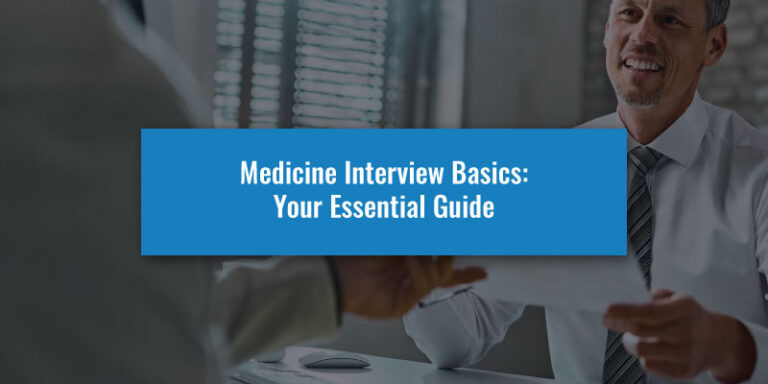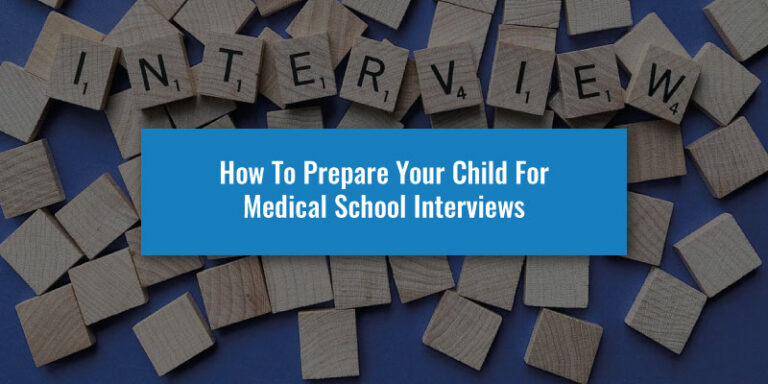What are the most common medical school interview questions asked? And how can you prepare to answer them effectively?
Medical School Interview questions are renowned for being challenging. They are always asked in a logical manner, however, you’re unlikely to get asked multiple uncomfortable questions in one interview. Ultimately, the best way to prepare is to practice with real people that you’ve never met before as this simulates what your actual interviews will be like.
This guide will show you the general types of medical interview questions you might face and some interview styles used by medical schools. Plus, we highlight ten of the most common questions used by medical schools and what you should think about when providing an answer. There’s a lot to unpack, so let’s get started:
The Types of Medicine Interview Questions
Before delving into common examples of questions, we need to understand how questions in medicine interviews are generally categorised and structured. The first thing to note is that the types of questions we’ll be discussing are more traditional-style questions (e.g. verbal questions and answers).
These types of questions are closely linked to panel-style interviews, as well as the “Traditional” interviews used by Oxford and Cambridge. However, although Multiple Mini Interviews (MMIs) are structured very differently from these, you will still likely be asked at least a couple of these questions in between the role-playing and ethical scenarios.
The following are the various types of questions that are common types of questions you will see at a medicine interview and examples of how they are used in an interview context. While some of these types are quite general, it’s still important to understand how they may be used by an interviewer.
Generic Background Questions
These are largely icebreaker questions, designed to begin the interview and put you at ease:
- “Tell us about yourself”
- "How was your journey here?"
Motivational Questions
These ask about why you decided this course was for you, and test how serious you are about the subject:
- “Why medicine, and not nursing or some other health related profession?”
- “Why do you want to study here?”
Competencies and Reflective Learning
Here you are asked about what you are good at, and what you can improve on. The purpose of this is pretty self-explanatory, but interviewers will be looking for an honest answer, not a boastful one:
- “How will you handle the stress of work?”
- “Tell us about a team activity you organised. What went badly? What could have been improved?”
Depth of Interest Questions
This type of question is geared towards specific areas of knowledge, to see what research you have personally done. This will usually relate to your wider reading, so ensure you have put the legwork in ahead of time:
- “Can you tell me about a significant recent advance in Medicine?”
- “Have you read any publications recently?”
Ethical Debates and Current Affairs
Here interviewers will ask for your opinion on controversial matters, based on ethical dilemmas, or current news events. This is less about having the right answer and more about how well you articulate your views:
- “What is your opinion on euthanasia?”
- “Should someone who has smoked for the past 20 years be entitled to free healthcare?”
Clinical Scenarios
Once again, these questions will introduce controversial scenarios, but in the setting of a doctor at work in a hospital While these may be challenging, they aren’t expecting a perfect answer as they are more interested in your thought process:
- “You have one liver available for transplant, and two patients with equal medical need. One is an ex-alcoholic mother with two young children; the other is a 13 year old with an inborn liver abnormality. How would you decide to whom it should be given?”
- "Is it ethical to prescribe contraceptive medication to someone who is under the legal age to have sexual intercourse?”
Empathetic Scenarios
These questions test your understanding of empathy, to see if you can treat a patient with care and kindness. These may sometimes be general scenarios not related to medicine:
- “How do you respond to seeing a beggar on a street?”
- “How would you tell a patient that they are terminally ill?”
Creative, Innovative, and Imaginative Questions
These questions are usually fairly random and non-medical in nature, designed to test your ability to think outside the box:
- “If you had six months free and unlimited funding, what would you do?”
- “How many uses can you think of for a phone charger?”
With only 12% of UK Medicine applicants getting offers on average, it is crucial you nail your Medicine Interview.
With over 95 hours of guided study (including One-To-One Tuition, Mock Interviews, Intensive Courses and Comprehensive Materials), our expert Medicine Interview support truly gives you an advantage that can make the difference between an offer and rejection.
Discover our Medicine Interview Programme by clicking the button below to enrol and triple your chances of success.
10 Common Medicine Interview Questions & How to Answer Them
Now that we have a good idea of what kind of questions you can expect to see in a medicine interview, let’s look at ten of the most common ones and learn how you can answer them effectively. Bear in mind that although these are common questions, it is not guaranteed that these questions will appear in your interview. You may be asked a variation of a question or it may not be asked in any form. However, it’s always best to be prepared for them, so let’s take a look:
1. Why do you want to go to Medical School?
This seems like one of the most obvious medical school interview questions, but when you really think about it, can you articulate why you want to go into medicine? To best answer it, make sure you have done some research about what being a medical student, and ultimately a doctor, entails – the good and the bad.
Be passionate but also practical. You can use your Personal Statement as a starting point to expand on and use examples of experiences you’ve had in a work environment, or even in your personal life if you don’t mind sharing.
Another important point to get across is why you want to study medicine rather than, say, nursing – it could be that the combination of science and helping people is what attracts you. The important thing is that you make it clear that your core interest lies and medicine and everything the course will teach you.
2. Tell us about an interesting article that you have read recently that relates to your interests in medicine
This is a question to check whether your passion for medicine has carried over into your free time and isn’t just confined to science lessons at school. Ultimately, medicine is a profession, a life choice, not a 9 to 5 job that you can forget about at the end of the day.
Of course, if you’ve already began your wider reading, this shouldn’t be a problem for you to answer. If you aren’t sure where to start, try reading publications such as Student BMJ (or the professional version), or New Scientist – both contain articles about what’s going on in the healthcare world currently. You should manage to find something about an area you are particularly interested in, such as mental health or advancements in medical technology.
Try and have a couple of articles/topics in your arsenal for interview day and remember; re-read them before the interview so you don’t forget what the article was about. Finally, in the interview, explain why you found the article interesting or exciting. Stating facts you’ve read will not get you far, so you need to be able to express your own thoughts on the piece.
3. What do you think is the biggest problem facing the NHS right now?
This is a relatively free question, as it allows you to mention anything you feel you know most about or have the strongest feelings towards. However, variants can include being asked about specific problems, such as the strike action for nurses or the privatisation of the NHS.
Make sure you have read up on various issues the health service is facing at the moment, especially those that are making headlines in the news. As well, you should think about why they are problematic, even if you have a different opinion on the matter. There are no right or wrong answers to questions like these, but being able to look at an issue from different perspectives is an important skill to demonstrate.
For example, you may be asked about the overuse of antibiotics and the resistance to these that is developing – you should mention why this is a problem (because we can’t treat people without antibiotics) and what can be done to prevent it (encourage doctors not to prescribe them unless absolutely necessary).
4. Why did you choose this medical school?
This question requires you to have really thought about why you would be happy to study at this medical school. It’s important that you think about it, even if you picked it because it had low entry requirements or an appealing student lifestyle.
If you get asked this interview question, think about what makes this medical school stand out from the others – perhaps they offer ways to customise what you study, or maybe it’s the use of PBL over traditional. Think back to the questions you asked yourself when you were choosing a medical school to apply to.
This question is very popular with the more prestigious medical schools in the country, including Oxford and Cambridge. Therefore, they want to see that people have done their research and really understand why their medical school is special.
5. How much does a mountain weigh?
Medical school interview questions like these generally don’t have a correct answer and are all about seeing your thought process in action. Therefore, it’s very important you talk through your answer in a clear, step-by-step way.
You should try to apply reasoning and science to medical school interview questions such as these where possible, although there’s only so much you can do to calculate the weight of a mountain! It’s okay to ask for a moment if you need to think, but don’t take too long. Any questions you ask should be logical, such as asking how tall the mountain is, or about its radius which you could then use in a known mathematical formula.
Sometimes the interviewer may not give you any more information, in which case it’s important for you just to mention what other information you might need and how you might get that information e.g. from a map.
6. Talk to me about the ethical issues surrounding abortion. Do you agree with it?
When talking through ethical questions, you need to apply the Four Pillars of Ethics. These are:
- Autonomy — For example, does it show respect for the patient? Does it show their right to make decisions?
- Non-maleficence — Does it harm the patient?
- Justice — Are there consequences that could affect the wider community?
- Beneficence — Does it benefit the patient?
When giving your own opinion, you must weigh up both sides of the argument before coming to a decision. For instance, acknowledge the views of pro-life campaigners and the rights of the mother.
As we mentioned before these sorts of questions don’t have a right or wrong answer. You have no idea what your interviewers’ thoughts on the topic are, they may even have different opinions between themselves. What you’re being assessed on is your ability to competently discuss a complex issue in a nuanced and understanding manner.
7. What is your biggest weakness?
This is a very common question in all kinds of interviews, not just medical school ones. For this question, make sure you consider what your weaknesses are. It must not be something that is so debilitating that it will make being a doctor impossible (e.g. you’re particularly squeamish), but it should also be something you can demonstrate that you’re working on. It is also very important that you don’t say something that isn’t actually a weakness, such as “I’m a perfectionist”. Any interviewer will immediately see this as a red flag in regards to your ego and attitude.
8. Give an example of a time you worked in a team and how this approach contributed to the outcome
Doctors will almost never be working alone, but rather in a multi-disciplinary team where everyone has a different background and different experiences. You need to show you are not only prepared for this but are excited about it, and that you can see what benefits it brings to a task. Thankfully, there are many opportunities you can create yourself to aid with this before you enter your interviews.
When giving your example, set it out with a formula such as STARR (Situation, Task, Action, Result, Reflection) so that you can get all the information across in a clear way. Make sure you talk about your role in the team, as this is what the interviewer is looking for. Remember not to take too long when describing the situation – this makes your answer lack focus.
9. Can you tell me about a difficult situation you observed or had to deal with on your work experience and what you learnt from this?
Medical school interview questions like these are to show you are aware of the realities of working as a doctor. In these situations, it is the ability to use initiative and adapt that the interviewer is looking for, as a doctor has to do often. When preparing for a medical interview question like this one, you can also use a formula like STARR. Your reflection should note that the experience has made you aware of how important a skill such as communication or flexibility is in a doctor.
10. Instruct me how to unwrap this box, without using your hands or helping me in any way other than verbally.
This question is more so likely to appear at an MMI station than in a typical Panel interview, but it’s a question that is less about the specific solution and more about what the interviewer is trying to achieve.
You need to make sure you are very clear with questions like this, as the examiner will do exactly what you say. So if you are vague with your instructions, the outcome will not be achieved (e.g. saying “lift the flap” – the examiner will open any flap and not necessarily the one you wanted them to.)
First, you can explain the aim to the interviewer so that they know you have understood the task. Ask them if they are ready to begin. Then be specific with instructions, such as asking them to lift the right flap upwards with their right hand. Stay calm and patient, and reword instructions if necessary.
If you haven’t guessed already, the purpose of this exercise is to get you to demonstrate your communication skills, an essential skill for any career in the field of medicine. The idea is to be a precise with your words as possible in order to successfully complete the task. Don’t be disheartened if you don’t manage to get the box open – the point of the exercise is communication.
Access "The Big Book Of Oxbridge Applications" For FREE
Want to study medicine at Oxford or Cambridge? Our free book –The Big Book Of Oxbridge Applications, is available for free and covers everything you need to know about the application process! Through over 350 pages, you will find:
- Proven A-Level study techniques
- 28 example Oxbridge Personal Statements
- Over 40 admissions test practice questions
- Interviews with Oxbridge students and graduates
- Additional downloadable resources
Fill in your details below to claim your digital copy today!

More Medicine Interview Questions you may be asked
In reality, there is an endless amount of questions that could be asked at your interviews, so there’s no way of listing them all down. However, the following is a selection of potential questions that may come up:
Motivation Questions
- "What do you see yourself doing in 20 years?"
- “What speciality are you interested in?”
- “What famous alumni at our university do you know of?”
- “What are the disadvantages of a career in medicine?”
Competencies and Reflective Learning
- "Are you a leader or a follower?"
- “Tell me about a time when you showed good communication skills.”
Depth of Interest Questions
- "What differentiates the NHS from all other healthcare systems in the world?”
- "Why do you believe the NHS is seeing an increase in strike action?”
- "What would you say was the biggest mistake made during the COVID-19 pandemic?”
Ethics Questions
- "Should doctors be banned from smoking?”
- "Should the NHS fund IVF? What about injuries that arise from extreme sports e.g. Mountain climbing?”
- "You’ve been appointed the new health secretary to the NHS. You’re given £1 Million to spend on either an MRI machine or on 50 liver transplants for patients with alcoholic cirrhosis. Which one would you choose?”
- "Do you think pharmaceutical companies should be able to advertise on merchandise?”
Clinical Scenarios
- "A Jehovah’s witness is brought in by an ambulance to A&E after being in a road traffic accident. They need an urgent blood transfusion but the patient is refusing it. What do you do?”
- “You are a junior doctor on colorectal surgery. Your consultant in charge turns up on Monday morning smelling strongly of alcohol. What do you do?”
- “You are a junior doctor and on your way back from work after a busy night shift. At the car park, you find someone who has collapsed and requires CPR. You remember that you aren’t insured to do CPR outside the hospital – what do you do?”
Questions Relating to Work Experience
We’ve discussed a lot of questions surrounding medicine as a general subject, but your interviewers are also going to want to know about any work experience you have undertaken, specifically in the field of medicine.
- "What did you learn from your work experience?”
- "Compare and contrast your experiences at the GP and hospital.”
- "How did your work experience change your views of medicine?”
- "Tell me more about your voluntary work. Did you find it more or less useful than your work experience?”
- "You didn’t actually do much work experience- why was this?”
Final Medicine Interview Tips
Before we finish, here are a few final tips to help you get started with your medicine interview preparation:
- Seek support for your application from family and and friends.
- Make sure you know about the university you are applying for in particular, as you may be asked why you applied THERE specifically.
- Read up on the debates surrounding the NHS and on issues relating to medical ethics.
- Keep up-to-date with the news and form your own opinions on the stories you see.
- Do some research into an area of medicine that interests you, and be ready to talk about it!
- Discover our Oxbridge Medicine Reading Lists
Early Interview preparation is essential in getting accepted to your dream medical school. Don’t leave it too late.
Our Medicine Interview Programme is designed to give you the highest chance of a Medicine offer at the Interview stage. Your expert tutor will work with you based on your needs and personal circumstances to craft a strong Interview strategy that truly gives you an advantage that can make the difference between an offer and rejection.
Discover our Medicine Interview Programme by clicking the button below to enrol and triple your chances of success.








